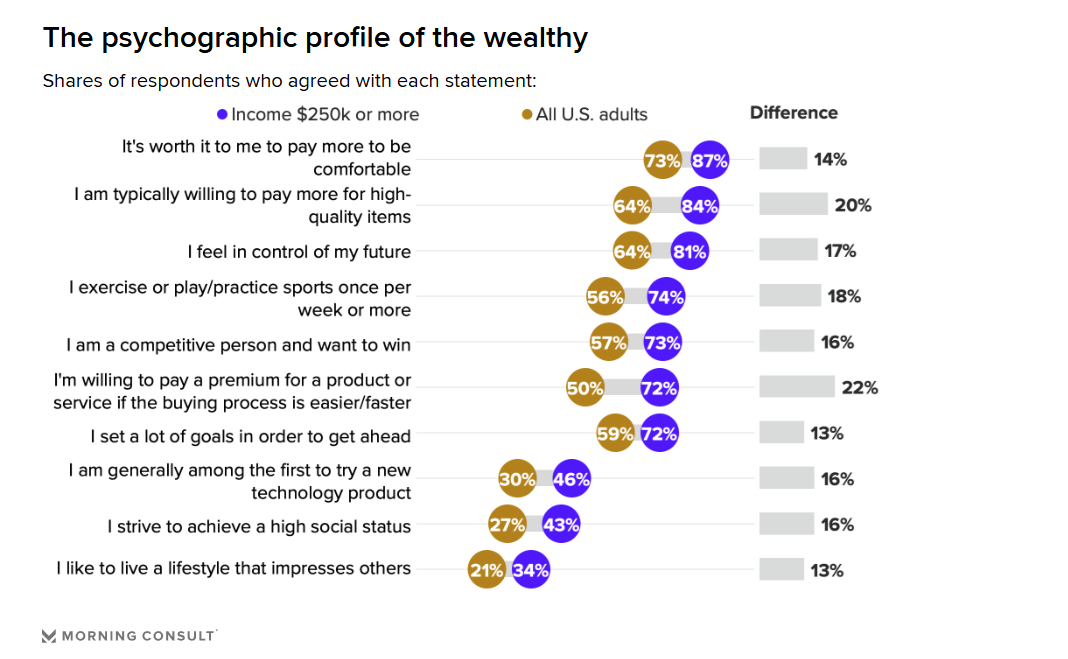
Social media use is ubiquitous in American life. But wealthy Americans — those with a household income of $250,000 or more each year — have some unique quirks.
And because this is such a coveted demographic for so many marketers and PR professional, it behooves us to understand where these high-income individuals spend their time and where they can best be reached.
New data from Morning Consult explains how wealthy Americans differ from the general population — and how you can use this to your advantage.
LinkedIn and Yelp overperform with the wealthy
In many areas, high-income households are much like the rest of the hoi polloi. For instance, there’s only 1% of variance between YouTube use between the wealthy and the overall population, in large part because everyone uses it (91% of $250K+ households, 92% of all households). Facebook is slightly less popular with wealthy households, and Instagram is slightly more popular.
But there are some more notable gaps.
The biggest, perhaps, isn’t surprising. LinkedIn is 22 points more popular with the wealthy than the overall population (61% vs 39%). Given the correlation between white collar work and higher income, it’s not a shock that these individuals are more likely to spend their time on the professional social networking site. This is yet another mark in favor of LinkedIn as a rising star on the social media scene — even B2C brands might make some progress by courting the high-net worth individuals who prowl the job listings and thought leadership.

The next largest gap comes from a site not often thought of as social media at all — Yelp. While specialized, Yelp does allow users to connect over reviews with various businesses. Those making $250K or more are 19 points more likely to hunt through the listings to find the best restaurants, plumbers and other businesses, perhaps indicating that even though these folks may have more money, they still want the best services.
Richer people are also more likely to use X (by 13 points) and Reddit (by 10 points) than the general population. These information-driven sites offer opportunities to network and share experiences beyond one’s real-life social circle, which may be appealing to those with a little extra coin.
When we look at these overperforming social media sites as a whole, we find a pattern of sites that emphasize quality, networking and information sharing. This, too, fits in with psychographic information Morning Consult gathered on the same demographic.
What motivates wealthy individuals
For instance, the popularity of Yelp may be borne out in two psychographic findings that are significantly higher than those of the general population. Those with a household income of at least $250K were 14 points more likely to say it’s worth it to pay more to feel comfortable, while they were 20 points more likely to be willing to pay more for high-quality items. These desires may explain why these people are so interested in the reviews and social proof found on Yelp or in some Reddit communities. In order to pay more for high-quality goods and services, one has to identify those — and trust in fellow users is high.
Other psychographic qualities that likely tie back to social media use are this cohort’s higher interest in goal setting (+13), achieving high social status (+16) and an interest in new technology (+16). The first two items in particular likely tie back to LinkedIn, a platform for the highly motivated and upwardly mobile, where goal setting is a daily topic of conversation. Meanwhile, that interest in technology can explain a higher interest in both X and Reddit, where innovation and gadgets are popular discussion topics.
The importance for PR pros
Understanding not only where wealthy people spend their digital time but also why they spend it there can result in better overall social media targeting. Digging deeper to understand the motivating factors can ensure not only that you’re spending your time in the right places, but also crafting the right messages that will speak to the egos, needs and desires of this group.
Allison Carter is editorial director of PR Daily and Ragan.com. Follow her on LinkedIn.
This post was originally published on this site be sure to check out more of their content








